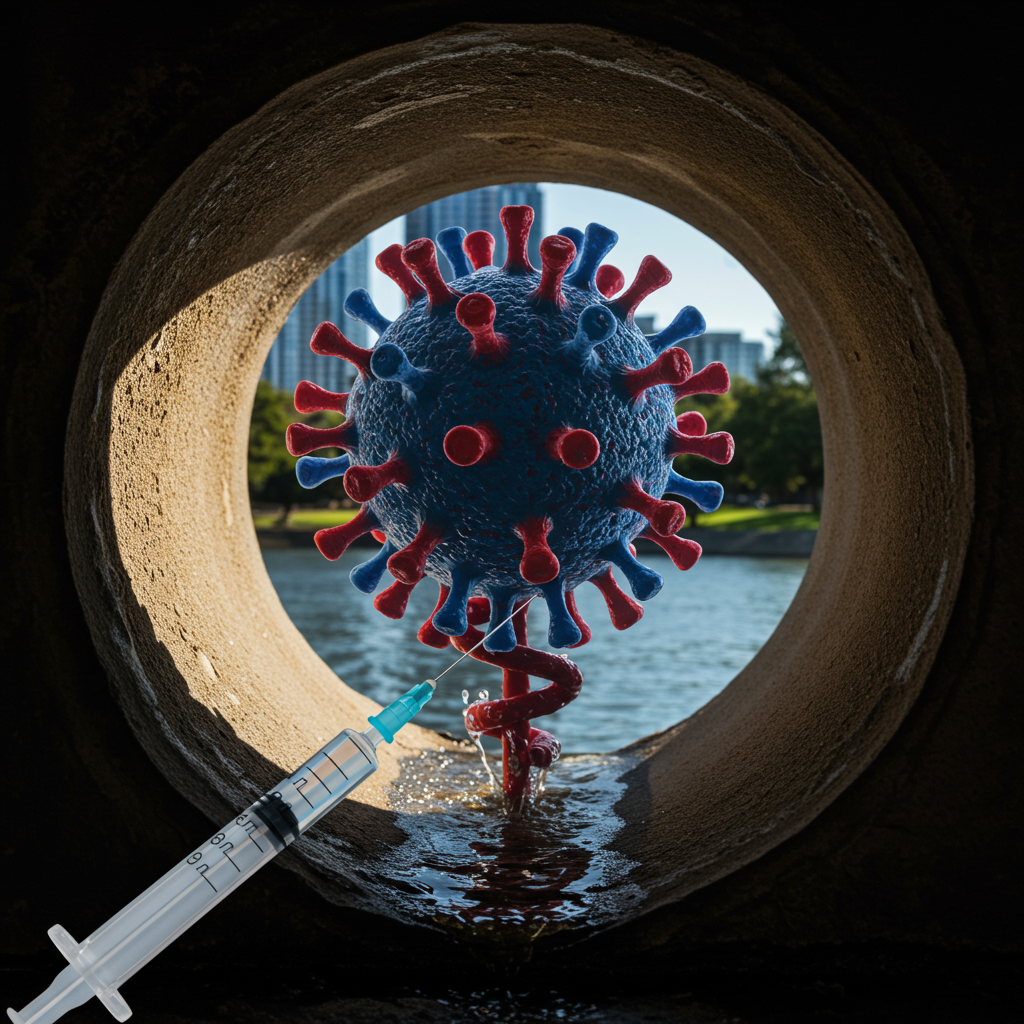Austin is on high alert after a critical public health announcement: traces of the highly contagious measles virus have been detected in the city’s wastewater system. Austin Public Health (APH) confirmed this concerning finding, urging all residents to prioritize their health and update their measles, mumps, and rubella (MMR) vaccinations immediately. This discovery serves as an urgent early warning, indicating that while no widespread outbreak has occurred yet, the potential for local transmission is real and growing.
Unpacking the Wastewater Discovery
The presence of measles virus in Austin’s wastewater, identified through routine surveillance during the first week of July, is a significant public health indicator. APH received confirmation of these test results on July 18. This sophisticated wastewater surveillance program acts as an invaluable early warning system, allowing health authorities to detect the presence of viruses and pathogens in a community even before widespread clinical cases are reported.
Dr. Desmar Walkes, Austin-Travis County Health Authority, emphasized the gravity of the situation. She highlighted that detecting the virus in wastewater means it is circulating in the community. This underscores the critical need for robust public health measures, especially increased vaccination rates. The core message is clear: vaccination is the most effective shield, protecting individuals, their families, and the broader community.
The Serious Threat of Measles
Measles is far more than just a childhood rash; it is a highly contagious respiratory illness with serious potential consequences. It spreads with frightening ease. When an infected person coughs or sneezes, tiny airborne droplets containing the virus can travel through the air. These viral particles can remain infectious in the air and on surfaces for up to two hours after the infected individual has left an area. This incredible transmissibility means that if one person contracts measles, an alarming 9 out of 10 unvaccinated individuals nearby are highly likely to become infected.
Symptoms typically emerge one to two weeks after exposure. Initial signs often include a high fever, which can soar to 105°F, accompanied by a nagging cough, runny nose, and red, watery eyes. A few days later, the characteristic measles rash appears as flat, red spots. These spots usually begin on the face, then spread downwards to the neck, trunk, and eventually the rest of the body. Another distinct symptom, tiny white spots inside the mouth, may appear two to three days after the initial symptoms. An infected person is contagious from approximately four days before the rash appears until four days after, making early detection and isolation crucial.
Why Vaccination is Your Best Defense
The Measles, Mumps, and Rubella (MMR) vaccine is the gold standard for protection against measles. For full and lasting immunity, two doses of the MMR vaccine are typically required. This vaccine boasts an impressive success rate, significantly reducing the risk of contracting the disease. While a small percentage of vaccinated individuals might still get measles, their symptoms are usually much milder, and they are considerably less likely to transmit the virus to others.
Access to the MMR vaccine is widely available. You can typically receive it at your doctor’s office or local pharmacy. For children under 14 years old seeking vaccination at a pharmacy, a doctor’s prescription is generally necessary. Furthermore, Austin Public Health (APH) is committed to ensuring equitable access to this vital protection. Through its “Shots for Tots and Big Shots” clinics, APH offers the MMR vaccine to uninsured and underinsured Austinites, removing financial barriers for vulnerable populations.
Measles Activity in Travis County and Beyond
While the detection in wastewater is a new development, measles is not entirely new to Travis County this year. As of 2025, two confirmed measles cases have been reported in Travis County residents. Both of these cases were linked to travel, underscoring the ongoing risk posed by individuals returning from areas where measles is more common. One notable case involved an unvaccinated infant in Austin.
Despite measles being declared eliminated from the United States in 2000, it continues to be a global threat. Unvaccinated travelers, both American and international visitors, frequently reintroduce the virus into the U.S. This highlights the importance of robust vaccination rates locally to prevent these imported cases from sparking wider community outbreaks. There have also been reports of measles outbreaks in other counties across Texas, serving as a reminder that this is a statewide concern. Individuals planning travel within the state to areas with reported outbreaks should consult their healthcare provider about vaccination guidance.
Who is Most At Risk and What to Do
Measles poses significant health risks across all age groups, but certain populations are particularly vulnerable to severe complications. Children younger than five years old, unvaccinated individuals, pregnant women, and those who are immunocompromised face higher risks of serious illness, hospitalization, or even death. Common complications include ear infections and diarrhea, but more severe outcomes can involve pneumonia and encephalitis.
Given these risks, immunizing individuals who live with or are in close contact with these higher-risk groups becomes paramount. Creating a strong “herd immunity” within the community helps protect those who cannot be vaccinated due to age or medical conditions.
If you suspect you may have been exposed to measles or are exhibiting symptoms such as high fever, cough, runny nose, or red, watery eyes, it is crucial to act promptly. Contact your healthcare provider immediately for guidance. It is often recommended to call ahead before visiting a clinic or hospital to prevent potential transmission to other patients. Staying home from work or school during the contagious period (four days before to four days after the rash appears) is also vital to contain the spread.
Frequently Asked Questions
What does measles detection in wastewater signify for Austin residents?
The detection of measles traces in Austin’s wastewater signifies an urgent early warning that the virus is circulating within the community. While it doesn’t confirm a widespread outbreak, it indicates a heightened risk of local transmission. Austin Public Health uses this surveillance as a proactive measure, urging residents to update their MMR vaccinations to prevent an imminent outbreak and protect public health.
Where can Austin residents get the MMR vaccine?
Austin residents can get the measles, mumps, and rubella (MMR) vaccine at most doctors’ offices and local pharmacies. For children under 14 years old getting vaccinated at a pharmacy, a doctor’s prescription is typically required. Additionally, Austin Public Health (APH) offers the MMR vaccine to uninsured and underinsured Austinites through its “Shots for Tots and Big Shots” clinics, ensuring accessibility for all.
Who is most at risk from measles, and how can they be protected?
Individuals at highest risk from measles include children younger than five, unvaccinated people, pregnant women, and those who are immunocompromised. These groups face higher chances of severe complications like pneumonia or encephalitis. Protection is primarily achieved through the MMR vaccine. Vaccinating those who live with or frequently interact with high-risk individuals helps create a protective barrier, reducing the likelihood of transmission and severe illness in vulnerable populations.
A Call for Community Vigilance
The detection of measles in Austin’s wastewater is a powerful reminder that global health threats can quickly become local concerns. While measles was once considered eliminated in the U.S., its reintroduction through travel highlights the ongoing need for robust community-level vaccination. Protecting yourself with the MMR vaccine is not just a personal health choice; it is a critical step in safeguarding the health of your family, friends, and the entire Austin community. Act now to ensure you and your loved ones are protected against this highly contagious and dangerous disease.



